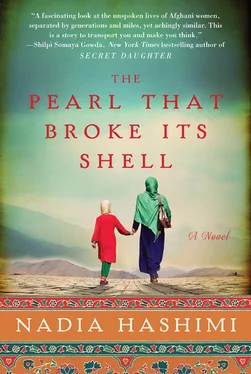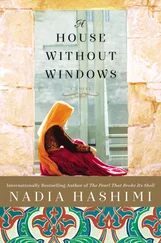Years passed. Shekiba’s features grew coarser; her palms and soles were thick and callused. Every day, Ismail’s back hunched more, his eyes saw less and his needs grew. There were days Shekiba was left to run the entire farm and house on her own.
Had Shekiba been any other girl, she probably would have felt lonesome in this solitary life, but her circumstances were different. The children nearby would always point and tease, as would their parents. Her appearance was shocking everywhere, except at home.
People who are beset by tragedy once and twice are sure to grieve again. Fate finds it easier to retrace its treads. Shekiba’s father became weaker, his voice raspier, his breaths shallower. One day, as Shekiba watched from the wall of stone and mud, he grabbed his chest, took two steps and crumpled to the ground with a sickle in his grip.
Shekiba was eighteen years old but she knew what to do. She dragged her father’s body back to the house on a large cloth, stopping every few steps to adjust her grasp and to wipe away the tears that trickled down the right side of her face. The left side of her face remained stoic.
She laid his body in the living room and sat at his side, repeating the four or five Qur’anic verses that her parents had taught her until the sun came up. In the morning, she began the ceremony she had performed too often in her short life. She undressed her father, careful to keep his private areas hidden beneath a rag. The ritual washing should have been done by a man but Shekiba had no one to call on. She would rather have invited Allah’s wrath into her home than turn to those vile people.
She bathed him, turning away as she poured water onto his man parts and blindly wrapping his stiff body in a cloth, as she and her mother had done with her sister. She dragged him back outside and opened the earth one final time to complete her family’s interment. Shekiba chewed her lip and debated digging one more spot for herself, thinking there would be no one left to do so when her turn came. Too tired to do anything more, Shekiba said a few prayers and watched her father disappear under clods of earth — disappear like her sister, her brothers and her mother.
She walked back to the hollow house and sat silently — afraid, angry and calm.
Shekiba was alone.
“We wouldn’t be the first. It’s been done before.”
“You’re listening to that lunatic Shaima and that story about your precious grandmother.”
“It wasn’t my grandmother. It was—”
“I don’t care. All I know is that woman makes my head ache.”
“Arif- jan, I think it would be wise for us to consider this. For everyone’s sake.”
“And what good will come of it? You see everyone else who has done it? They all have to change back in a few years. It doesn’t help anything.”
“But, Arif- jan, she could do things. She could go to the store. She could walk her sisters to school.”
“Do what you want. I’m going out.”
I listened carefully from the hallway, just a few feet from the bedroom we all shared. Our kitchen was behind the sitting room, a few pots and a gas burner. Our home was spacious, built in a time when my grandfather’s family had more. Now these walls were bare and cracking and looked more like those of our neighbors.
When I heard Padar- jan strain to get up, I quickly tiptoed off, my bare toes silent on the carpet. When I was sure he was gone, I came back to the living room to find my mother lost in thought.
“Madar- jan ?”
“Eh? Oh. Yes, bachem . What is it?”
“What were you and Padar- jan talking about?”
She looked at me and bit her lip.
“Sit down,” she said. I sat cross-legged in front of her, careful that the hem of my skirt reached over my knees and covered my calves. “You remember the story your khala Shaima told the other night?”
“The one about our great-great-great-great…”
“You’re worse than your father, sometimes. Yes, that one. I think it is time we change something for you. I think it would be best if we let you be a son to your father.”
“A son?”
“It’s simple and it’s done all the time, Rahima- jan . Just think how happy that would make him! And you could do so many things that your sisters wouldn’t be able to do.”
She knew how to pique my interest. I cocked my head to the side and waited for her to go on.
“We could change your clothes and we’ll give you a new name. You’ll be able to run to the store any time we need anything. You could go to school without worrying about the boys bothering you. You could play games. How does that sound?”
It sounded like a dream to me! I thought of the neighbors’ sons. Jameel. Faheem. Bashir. My eyes widened at the thought of being able to kick a ball around in the street as they did.
Madar- jan wasn’t thinking of the boys in the street. She was thinking of our empty cupboard. She was thinking of Padar- jan and how much he had changed. We were lucky when he brought home some money from an odd job here or there. Every once in a while, his mind focused enough that he was able to tinker with an old engine and breathe life back into it. His small earnings were spent, unevenly, on his medicine and keeping us clothed and fed. The more Madar- jan thought about it, the more she realized how desperate our situation was becoming.
“Come with me. There’s no reason to delay anything. Your father is taking more and more… medicine these days. Your khala Shaima is right. We need to do something or we’re going to be in real trouble.”
We girls were nervous about getting sick. We worried that if we did, we would have to take the same medicine that Padar- jan took. It made him do funny things, behave in funny ways. Mostly he just wanted to lie about the house and sleep. Sometimes he said things that didn’t make sense. And he never remembered anything we said. It was worse when he didn’t take his medicine.
He had broken nearly everything in the house that could be broken. The dishes and glasses survived only because he lacked the energy to pull them from the cabinet. Anything within reach had already been thrown against a wall and smashed to pieces. A ceramic urn. A glass plate that Madar- jan had received as a gift. They were casualties of the war inside Padar- jan ’s head.
Padar- jan had fought with the mujahideen for years, shooting at the Russian troops that bombarded our town with rockets. When the Soviets finally slinked back to their collapsing country, Padar- jan came home and prayed that life would return to normal, though few people could recall such a time. That was 1989.
In that year, he returned home to his parents, who barely recognized him as the seventeen-year-old boy who had left home with a gun slung over his shoulder in the name of God and his country. His mother and father hurriedly arranged a marriage for him. At twenty-four years old, he was long overdue and they thought a wife and children would bring him back to normal, but Padar- jan, just like the rest of the country, had forgotten what normal was.
Madar- jan was barely eighteen when they were wed. I imagine she must have been as terrified on her wedding night as I was on mine. Sometimes I wonder why she did not warn me, but I suppose those are not things women should speak of.
As the country planned for new beginnings, so did my parents. My sister Shahla came first, followed by Parwin and me. Then came Rohila and Sitara. We were all a year apart and close enough in age that only our mother could tell us apart once we were walking. But with one daughter after another, Madar- jan did not become the wife that Padar- jan expected. Even more sorely disappointed was my grandmother, who had respectably borne five sons and only one daughter.
Читать дальше












